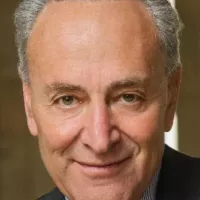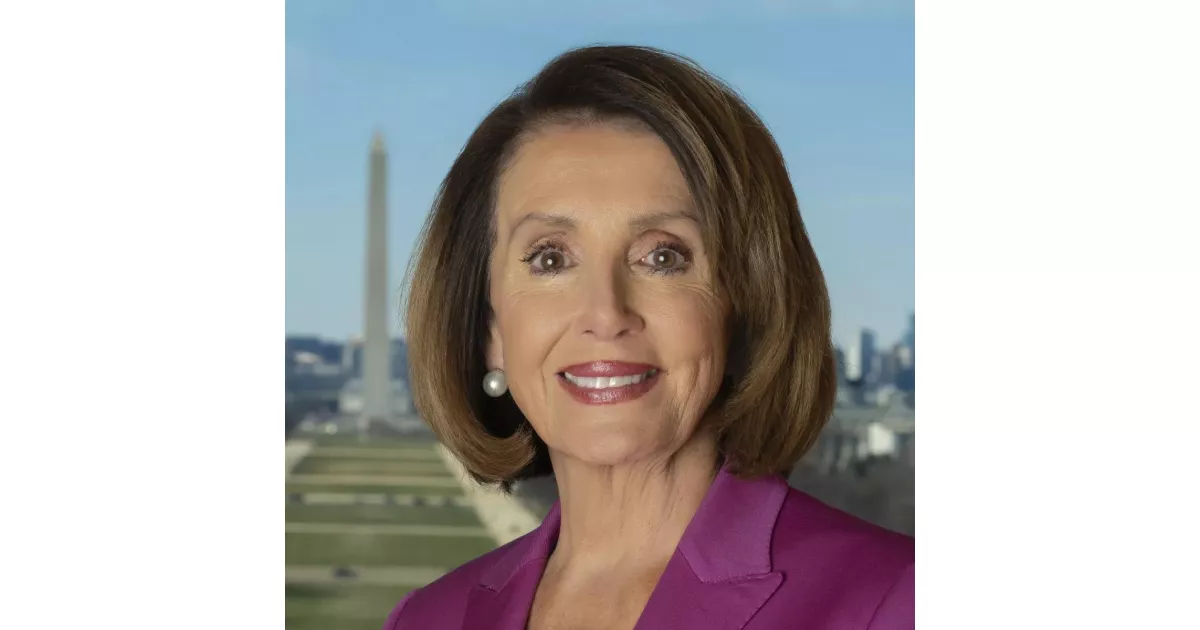Discover the career path of Nancy Pelosi, from the first major opportunity to industry-changing achievements.
Nancy Pelosi is a prominent American politician, notably serving as the 52nd Speaker of the House of Representatives twice (2007-2011 and 2019-2023). As a Democrat representing California's 11th district since 1987, she made history as the first female Speaker and the first woman to lead a major party in Congress, heading House Democrats for two decades. Her long tenure as a House leader is second only to Sam Rayburn. She remains a significant figure in American politics and the dean of California's congressional delegation.
1976: Pelosi Elected to Democratic National Committee
In 1976, Nancy Pelosi was elected as a Democratic National Committee member from California, a position she held until 1996.
1977: Pelosi Elected Party Chair for Northern California
In 1977, Nancy Pelosi was elected party chair for Northern California.
1983: Pelosi Heads California Democratic Party
In 1983, Nancy Pelosi stepped down as head of the California Democratic Party.
1984: Pelosi Chairs Democratic National Convention Host Committee
In 1984, Nancy Pelosi served as the San Francisco Democratic National Convention Host Committee chairwoman.
1985: Pelosi Chairs Democratic Senatorial Campaign Committee
In 1985, Nancy Pelosi served as the Democratic Senatorial Campaign Committee finance chair until 1986.
1986: Pelosi Chairs Democratic Senatorial Campaign Committee
In 1986, Nancy Pelosi finished serving as the Democratic Senatorial Campaign Committee finance chair, after starting in 1985.
February 1987: Pelosi Wins Special Election
In February 1987, Pelosi won the special election to succeed U.S. Representative Sala Burton, defeating Harry Britt in the Democratic primary and Harriet Ross in the general election.
1987: Pelosi Enters the House of Representatives
In 1987, Nancy Pelosi was elected to the House of Representatives, representing California's 11th congressional district.
March 1988: Pelosi Votes for Civil Rights Restoration Act
In March 1988, Nancy Pelosi voted for the Civil Rights Restoration Act of 1987 and to override President Ronald Reagan's veto.
April 28, 1988: Abandoned Shipwrecks Act Signed into Law
On April 28, 1988, President Ronald Reagan signed the Abandoned Shipwrecks Act of 1987 into law, which Nancy Pelosi voted for.
1988: Pelosi Reelected to the House
In 1988, Nancy Pelosi was reelected to the House, winning an average of 80% of the vote over her first seven reelection campaigns (from 1988 through 2004).
1988: Pelosi Wins Re-election in California's 5th Congressional District
In 1988, Pelosi won re-election in California's 5th congressional district, receiving 76 percent of the vote.
1988: Pelosi Succeeds Sala Burton in Congress
In 1988, after Sala Burton decided not to run for reelection and endorsed Pelosi, Nancy Pelosi won the special election to succeed her in Congress.
1989: Pelosi seeks harsher position toward China after Tiananmen Square protests
After the 1989 Tiananmen Square protests, Pelosi sought to take a harsher position toward China than President George H.W. Bush, criticizing his China policy with the support of Senate Majority Leader George Mitchell.
December 1990: Ryan White CARE Act Signed Into Law
In December 1990, President George H. W. Bush signed the Ryan White CARE Act into law, which Nancy Pelosi co-authored to allocate funding for HIV/AIDS treatment and services.
1990: Pelosi Wins Re-election in California's 5th Congressional District
In 1990, Pelosi won re-election in California's 5th congressional district, receiving 77 percent of the vote.
1991: Pelosi Opposes U.S. Intervention in Gulf War
In 1991, Nancy Pelosi opposed U.S. intervention in the Gulf War.
1991: Pelosi unfurls banner in Tiananmen Square
In 1991, as part of a Congressional delegation, Pelosi unfurled a banner in Tiananmen Square, leading to a confrontation with Chinese police, she advocated for Chinese political prisoners and dissidents to be able to come to the U.S.
1992: Pelosi Runs in California's 8th Congressional District
In 1992, after redistricting, Pelosi ran in California's 8th congressional district and continued to post landslide victories.
1994: Brady Handgun Violence Prevention Act Becomes Law
In 1994, the Brady Handgun Violence Prevention Act, which Nancy Pelosi helped shape, became law.
1995: Vote Against Balanced Budget Amendment
In 1995, Nancy Pelosi voted against the 1995 Balanced Budget Proposed Constitutional Amendment, which passed the House but failed to reach the required supermajority in the Senate.
1995: Pelosi Votes in Favor of Jerusalem Embassy Act
In 1995, Nancy Pelosi voted in favor of the Jerusalem Embassy Act, which urged the federal government to relocate the American embassy in Israel to Jerusalem, indicating her consistent support for Israel.
1996: End of Pelosi's term in Democratic National Committee
In 1996, Nancy Pelosi's term as a Democratic National Committee member from California ended.
1998: Vote in Favor of Abortion Funding Amendment
In 1998, Nancy Pelosi voted in favor of the Abortion Funding Amendment, which would have allowed the use of district funds to promote abortion-related activities, but would have prohibited the use of federal funds.
1999: Co-sponsorship of Legislation Omitting American Samoa from Minimum Wage Increase
As early as 1999, Nancy Pelosi co-sponsored legislation that omitted American Samoa from a raise in the minimum wage.
1999: Vote against displaying the Ten Commandments
In 1999, Nancy Pelosi voted against displaying the Ten Commandments in public buildings, including schools.
1999: Pelosi calls on Clinton to address 1989 protests with Chinese Premier
In 1999, ahead of Chinese Premier Zhu Rongji's visit to the U.S., Pelosi called on President Clinton and Vice President Gore to ask Zhu to recognize the 1989 protests as a pro-democracy effort.
2001: CIA Misleading Congress
In 2001, CIA Director Leon Panetta had asserted that the CIA misled Congress for a number of years.
2001: Pelosi Elected House Minority Whip
In 2001, Nancy Pelosi was elected as the House Minority Whip, defeating John Lewis and Steny Hoyer.
November 15, 2002: Pelosi Elected House Minority Leader
On November 15, 2002, Nancy Pelosi was elected to replace Dick Gephardt as House minority leader, defeating Harold Ford Jr. after Marcy Kaptur withdrew.
November 2002: Pelosi Elected House Minority Leader
In November 2002, Nancy Pelosi was elected to replace Dick Gephardt as House minority leader, becoming the first woman to lead a major party in either chamber of Congress.
2002: Del Monte's acquisition of StarKist Tuna
In 2002, Del Monte acquired StarKist Tuna.
2002: Briefing on Enhanced Interrogation Techniques
In 2002, as the ranking member of the House Intelligence Committee, Nancy Pelosi was briefed on the use of enhanced interrogation techniques, including waterboarding, on Abu Zubaydah. Following the briefing, Pelosi stated she was assured by CIA and Department of Justice lawyers that the methods were legal.
2003: Pelosi Leads House Democrats
In 2003, Nancy Pelosi began leading the House Democrats, a position she held until 2023.
2003: Vote Against Partial-Birth Abortion Ban Act
In 2003, Nancy Pelosi voted against the Partial-Birth Abortion Ban Act.
2003: Pelosi leaves Congressional Progressive Caucus
In 2003, Pelosi left the Congressional Progressive Caucus after being elected House minority leader, though she remains widely considered a liberal.
2003: Hoyer Became Pelosi's Second-in-Command
In 2003, Steny Hoyer became Nancy Pelosi's second-in-command. He competed against John Murtha, Pelosi's longtime friend, for House majority leader.
2003: Support for Harman's Letter to CIA
In early 2003, Nancy Pelosi supported objections raised by Democratic colleague Jane Harman in a letter to the CIA.
2004: Pelosi Reelected to the House
In 2004, Nancy Pelosi was reelected to the House, winning an average of 80% of the vote over her first seven reelection campaigns (from 1988 through 2004).
2004: Pelosi opposed Bush's Social Security reform plan
In 2004, after President Bush proposed reforming Social Security, Nancy Pelosi, as minority leader, strongly opposed the plan. She imposed party discipline, leading to near-unanimous opposition within her caucus, and the proposal was defeated.
2005: Pelosi's Speech at AIPAC 2005 annual conference
In 2005 Nancy Pelosi supported the Syria Accountability Act and Iran Freedom and Support Act. In her speech at the AIPAC 2005 annual conference, Pelosi addressed the need for greater pressure on Russia and China regarding their technological support to Iran's nuclear and missile programs. Pelosi stated that if there's evidence of other nations participating in Iran's nuclear program, she would insist that the Administration use the evidence in determining how the U.S. deals with that nation.
May 2006: Pelosi Discussed Impeachment Investigations
In May 2006, Nancy Pelosi stated that while Democrats would conduct vigorous oversight of the Bush administration, an impeachment investigation was "off the table" with an eye on the upcoming midterm elections. However, she also mentioned that investigations might lead to impeachment.
November 16, 2006: Democratic caucus nominated Pelosi for speaker
On November 16, 2006, the Democratic caucus unanimously nominated Nancy Pelosi for speaker of the House, as she was widely expected to become speaker in the next Congress following the Democrats taking control of the House in the 2006 elections.
2006: Democrats Win House Majority
In 2006, Nancy Pelosi led the Democrats to a majority in the House for the first time in 12 years, paving the way for her speakership.
2006: Pelosi Votes on Congressional Initiative Regarding Palestinian Authority Elections
In 2006, before the elections in the Palestinian Authority, Nancy Pelosi voted for a Congressional initiative that disapproved of participation in the elections by Hamas and other organizations the legislation defined as terrorist, showing her continued support of Israel.
2006: Democrats take control of the House
In 2006, the election was seen as a call to change, particularly regarding the war in Iraq, with the American people rejecting an open-ended obligation. The Democrats gained control of the House with the largest seat gain since 1974.
2006: Pelosi Holds Replica Dog Tags of Israeli Soldiers
In September 2008, during the reception with Israeli Speaker of the Knesset Dalia Itzik, Nancy Pelosi held up replica dog tags of the three Israeli soldiers captured by Hezbollah and Hamas in 2006 and said she keeps them as a "symbol of the sacrifices made, sacrifices far too great by the people of the state of Israel".
January 4, 2007: Pelosi Elected Speaker of the House
On January 4, 2007, Nancy Pelosi was elected speaker of the House, defeating Republican John Boehner of Ohio with 233 votes to 202.
January 5, 2007: Pelosi and Reid Condemned Bush's Plan to Increase Troop Levels in Iraq
On January 5, 2007, Nancy Pelosi and Senate Majority Leader Harry Reid condemned President Bush's plan to increase troop levels in Iraq, reacting to suggestions from Bush's confidants, and sent him a letter expressing their disapproval.
January 12, 2007: Resolution Introduced Regarding Military Force Against Iran
On January 12, 2007, Congressman Walter B. Jones of North Carolina introduced a resolution requiring the president to consult with Congress and receive specific authorization before initiating military force against Iran, unless there was a national emergency due to an attack by Iran on the United States or its armed forces.
February 15, 2007: Pelosi Comments on Diplomatic Resolution with Iran
On February 15, 2007, Nancy Pelosi said that President Bush consistently stated his support for a diplomatic resolution to differences with Iran. She also believed Congress should assert itself and make it clear that the president did not have prior authority to go into Iran.
March 13, 2007: Resolution Removed from Military Spending Bill
On March 13, 2007, the resolution requiring the president to consult with Congress before initiating military force against Iran, which was introduced by Congressman Walter B. Jones, was removed from a military spending bill for the war in Iraq by Nancy Pelosi.
April 2007: Pelosi Visits Syria
In April 2007, Nancy Pelosi visited Syria, meeting with Foreign Minister Walid Muallem, Vice President Farouk al-Sharaa, and President Bashar al-Assad. This visit occurred despite President Bush's efforts to isolate Syria due to concerns about militants crossing into Iraq and the country's support for Hezbollah and Hamas. During her visit in April 2007, she conveyed a message of peace from Israeli Prime Minister Ehud Olmert and toured Al-Hamidiyah Souq and the Umayyad Mosque.
May 2007: Pelosi Scolds Colombian President Álvaro Uribe
In May 2007, Nancy Pelosi publicly scolded Colombian President Álvaro Uribe during his state visit to America. Pelosi met with Uribe and then released a statement expressing concerns about alleged links between paramilitary groups and Colombian government officials. She also opposed the Colombian free-trade agreement.
October 2007: Pelosi Pledged to Bring Armenian Genocide Resolution to Vote
In mid-October 2007, Pelosi pledged to bring a resolution labeling the 1915 killing of Armenians by Ottoman Turks as genocide to a vote, following its passage in the House Foreign Affairs Committee. This prompted warnings from President Bush and criticism from Turkey. After House support weakened, the measure's sponsors withdrew their call for a vote, and in late October 2007, Pelosi agreed to set the matter aside.
2007: Pelosi held firm against impeachment
After becoming speaker in 2007, Nancy Pelosi held firm against impeaching President Bush, despite strong support for it among her constituents.
2007: Pelosi Becomes Speaker of the House
In 2007, Nancy Pelosi became the 52nd Speaker of the United States House of Representatives.
2007: Protest against interrogation techniques
In 2007, Nancy Pelosi's office said that she had protested the use of enhanced interrogation techniques at the time they were being used.
2007: Pelosi Receives NIAF Special Achievement Award
In 2007, Pelosi received the NIAF Special Achievement Award for Public Advocacy from the National Italian American Foundation (NIAF), where she served for 13 years as a board member.
2007: Spearheading the Fair Minimum Wage Act
In 2007, as Speaker of the House, Nancy Pelosi spearheaded the Fair Minimum Wage Act as part of the 100-Hour Plan, raising the minimum wage in the United States and its territories.
September 2008: Pelosi Hosts Reception with Israeli Speaker of the Knesset
In September 2008, Nancy Pelosi hosted a reception in Washington with Israeli Speaker of the Knesset Dalia Itzik, along with 20 members of Congress, toasting to the "strong friendship" between Israel and the United States.
2008: Pelosi Opposes Embargo on Cuba
In 2008, Nancy Pelosi stated her opposition to the embargo on Cuba. She expressed that the embargo hadn't been successful and supported removing travel bans to allow for more people-to-people exchanges with Cuba.
2008: Pelosi Named Permanent Chair of Democratic National Convention
In 2008, Nancy Pelosi was named the Permanent Chair of the Democratic National Convention in Denver, Colorado.
2008: Pelosi criticizes China's handling of unrest in Tibet
In 2008, after meeting with the Dalai Lama and Tibetan officials, Pelosi criticized China for its handling of unrest in Tibet and called on "freedom-loving people" to denounce China for human rights abuses. She also commended the European Parliament for awarding the Sakharov Prize to Hu Jia and called for his release.
2008: Pelosi withstood a challenge for her seat
In the 2008 election, Nancy Pelosi withstood a challenge for her seat by antiwar activist Cindy Sheehan, who ran as an independent because of Pelosi's refusal to pursue impeachment.
January 25, 2009: Support for Family Planning Services
In a January 25, 2009, interview with George Stephanopoulos for ABC News, Nancy Pelosi expressed her support for family planning services because they would "reduce costs to states and to the federal government."
April 2009: Denial of Knowledge of Waterboarding
In April 2009, during a press conference, Nancy Pelosi stated that she was not informed that waterboarding or other enhanced interrogation techniques were being used during briefings, but that she was told the Office of Legislative Counsel had opinions that they could be used.
June 26, 2009: Allegations of CIA Misleading Congress
On June 26, 2009, Democratic lawmakers in the House signed a letter alleging that CIA Director Leon Panetta had asserted that the CIA misled Congress for a number of years spanning back to 2001.
2009: Passage of American Recovery and Reinvestment Act
In 2009, Nancy Pelosi helped pass the American Recovery and Reinvestment Act during her first speakership.
2009: Pelosi reelected speaker
In 2009, Nancy Pelosi was reelected as the speaker of the House.
January 2010: Pelosi Spearheaded Affordable Care Act
In January 2010, after the election of Republican Scott Brown cost Democrats their filibuster-proof majority, Nancy Pelosi spearheaded the passage of the Affordable Care Act, convincing Obama to pursue health care reform despite initial hesitation and successfully rallying her caucus. Obama called her "one of the best speakers the House of Representatives has ever had."
March 2010: Analysts Assess Pelosi's Power
By early 2010 and in March 2010, analysts were assessing Nancy Pelosi as possibly the most powerful woman in U.S. history and among the most powerful speakers of the previous 100 years.
November 2010: NPR Opines on Pelosi's Speakership
In November 2010, NPR offered an opinion on Nancy Pelosi's speakership.
November 2010: Politico Writer Called Pelosi's Record "Mixed"
In November 2010, after Democrats lost their House majority, a Politico writer called Nancy Pelosi's record as speaker "mixed". While acknowledging her power, the writer noted her poor approval rating and the negative impact of her legislative agenda, such as the Patient Protection and Affordable Care Act, on the party's electoral losses.
November 17, 2010: Pelosi Sought to Continue Leading House Democratic Caucus
On November 17, 2010, after the Democrats lost control of the House, Nancy Pelosi sought to continue leading the House Democratic Caucus as minority leader. She defeated Heath Shuler in the caucus vote.
2010: Pelosi runs in California's 12th congressional district
After redistricting from the 2010 census, Pelosi ran in California's 12th congressional district, which she represented for the next decade.
2010: Passage of the 2010 Tax Relief Act
In 2010, Nancy Pelosi helped pass the 2010 Tax Relief Act during her first speakership.
2010: Role in Passing the Affordable Care Act
In 2010, Nancy Pelosi was instrumental in passing the Patient Protection and Affordable Care Act. She played a key role in convincing President Obama to continue pushing for health-care reform after a special election defeat.
2010: Pelosi's Speakership Assessed Favorably
Later in 2010, scholars favorably assessed Nancy Pelosi's first speakership, with some considering her tenure among the greatest in U.S. history. She was praised for the passage of the Affordable Care Act and for allowing House passage of measures opposed by the majority of the Democratic House Caucus.
2011: End of First Speakership
In 2011, Nancy Pelosi's first term as Speaker of the House ended.
November 14, 2012: Pelosi Announced Intention to Remain Democratic Leader
On November 14, 2012, Nancy Pelosi announced that she intended to remain the Democratic leader.
2012: Gun Control Ratings
In 2012, Nancy Pelosi received a 0% rating from Gun Owners of America and a 7% rating from the National Rifle Association of America for her stances on gun control.
February 2013: Call for Bold Action on Gun Control
In February 2013, Nancy Pelosi called for the "Boldest possible move" on gun control.
2014: Pelosi supported Israel in the 2014 Israel–Gaza conflict
In 2014, Nancy Pelosi supported Israel in the Israel–Gaza conflict.
July 2015: Pelosi Confident in Obama Securing Iran Nuclear Deal
In July 2015, Nancy Pelosi stated that she was convinced President Obama would secure enough votes to pass the Iran nuclear deal, and she credited him with making a very strong and forceful presentation of his case supporting the nuclear agreement with Iran, calling the deal "a diplomatic masterpiece".
2015: Pelosi Supports Obama's Cuban Thaw
In 2015, Nancy Pelosi supported President Obama's Cuban Thaw, a rapprochement between the U.S. and the Castro regime in Cuba. She also visited Havana for meetings with high-level officials.
2016: Pelosi Argues Against Bills Blocking Iran's Access to the Dollar
In 2016, Nancy Pelosi argued against two bills that, if enacted, would block Iran's access to the dollar and impose sanctions for its ballistic missile program. She stated that regardless of support for the Joint Comprehensive Plan of Action (JCPOA), it was agreed that Iran must not possess a nuclear weapon, and at that time, the JCPOA was the best way to achieve this critical goal.
2016: Pelosi references Russian Interference in 2016 Election
In December 2017, Nancy Pelosi wrote a letter to Speaker Paul Ryan advocating for the continued House investigation into Russian interference in the 2016 election, stating that Americans deserved a comprehensive and fair investigation into Russia's attack and that America's democracy and national security were at stake. She cited the need to fully investigate Russia's assault on election systems to prevent future foreign attacks.
2016: Pelosi Praises Obama's Defense Assistance Memorandum of Understanding with Israel
Nancy Pelosi stated that Democrats were taking "great pride" in Barack Obama's Memorandum of Understanding (MOU) that Israel signed with the Obama administration in 2016, guaranteeing $38 billion in defense assistance over a decade.
January 2017: Pelosi Votes Against Resolution Condemning UN Security Council Resolution 2334
In January 2017, Nancy Pelosi voted against a House resolution that would condemn the UN Security Council Resolution 2334, which called Israeli settlement building in the occupied Palestinian territories in the West Bank a "flagrant violation" of international law and a major obstacle to peace. She also condemned the Boycott, Divestment, and Sanctions (BDS) movement targeting Israel.
March 10, 2017: Democrats Fighting Republican Efforts to Repeal Affordable Care Act
On March 10, 2017, Nancy Pelosi stated that the Democrats would continue battling Republican efforts to repeal the Affordable Care Act.
August 2017: Support for Removal of Confederate Monuments
In August 2017, Nancy Pelosi supported Senator Cory Booker's initiative to remove Confederate monuments and memorials from the Capitol Building through legislation.
August 2017: Pelosi Criticizes Trump's Comments on North Korea
In August 2017, following President Trump's warning that North Korea would be met with "fire and fury like the world has never seen" if it made further threats to the United States, Nancy Pelosi said the comments were "recklessly belligerent" and showed a "grave lack of appreciation" for the severity of the North Korean nuclear situation. She also said Trump's rhetoric eroded U.S. credibility.
November 2017: Pelosi Convened Meetings on Workplace Policies
In November 2017, after calling for John Conyers's resignation, Nancy Pelosi convened the first in a series of planned meetings on strategies to address reforming workplace policies in the wake of national attention to sexual harassment. She emphasized the moral duty to foster a climate of respect and dignity in the workplace.
November 2017: Pelosi Calls for Exhausting Remedies with North Korea
In November 2017, after the Pentagon stated that a ground invasion was the only way to destroy all North Korea's nuclear weapons without concern for missing any, Nancy Pelosi expressed concern about Pyongyang selling nuclear technology to third parties and called for the United States to "exhaust every other remedy".
December 2017: Opposition to Trump's Tax Reform
In December 2017, Nancy Pelosi opposed the tax reform signed by President Trump, calling it one of the worst bills in U.S. history and criticizing its impact on the middle class and national debt.
December 2017: Pelosi Advocates for Continued House Investigation into Russian Interference
In December 2017, Nancy Pelosi wrote a letter to Speaker Paul Ryan advocating for the continued House investigation into Russian interference in the 2016 election, stating that Americans deserved a comprehensive and fair investigation into Russia's attack and that America's democracy and national security were at stake. She cited the need to fully investigate Russia's assault on election systems to prevent future foreign attacks.
2017: Criticism of Confederate Artworks in the Capitol
In 2017, Nancy Pelosi criticized the presence of artworks in the United States Capitol that depicted individuals who supported the Confederacy during the American Civil War, including at least 10 statues in the National Statuary Hall Collection. She noted the difficulty in removing or replacing these statues due to a process requiring the consent of state legislatures and governors.
January 2018: Response to Corporate Bonuses After Tax Cuts
In January 2018, Nancy Pelosi responded to companies crediting tax cuts with allowing them to raise wages and give bonuses, calling the benefits workers received "crumbs" compared to corporate gains.
February 2018: Pelosi Breaks House Speech Record
In February 2018, Pelosi broke the record for the longest House speech, speaking for over eight hours to recount stories from DREAMers. She was objecting to a budget deal that would raise spending caps without addressing the future of DACA recipients, who were at risk of deportation by the Trump administration.
February 2018: Pelosi Accuses Trump of Siding with Putin
In February 2018, after the release of a Republican report alleging surveillance abuses by the Justice Department, Nancy Pelosi accused President Trump of siding with Russian president Vladimir Putin at the expense of preserving intelligence sources and methods.
March 2018: Pelosi on the Establishment of the State of Israel
In March 2018, Nancy Pelosi stated, "There is no greater political accomplishment in the 20th Century than the establishment of the State of Israel."
March 2018: Pelosi Urges Trump to Focus on China
In March 2018, before the Trump administration took concrete measures against China, Nancy Pelosi and other Democratic leaders urged President Trump to focus more on China. Pelosi pressed Trump to impose punishments, such as naming China a currency manipulator, stopping China from pressuring U.S. tech companies into giving up intellectual property rights, and taking a strong stand against unfair market barriers in China.
May 2018: Pelosi on Trump's Withdrawal from Iran Nuclear Deal
In May 2018, after President Trump announced his intention to withdraw from the Iran nuclear deal, Nancy Pelosi stated that the decision was an abdication of American leadership and described it as "particularly senseless, disturbing & dangerous".
June 2018: Pelosi on Trump's Praise of Kim Jong-un
In June 2018, after President Trump praised North Korean leader Kim Jong-un, Nancy Pelosi stated, "In his haste to reach an agreement, President Trump elevated North Korea to the level of the United States while preserving the regime's status quo."
July 2018: Speech on Expanding Healthcare Coverage
In July 2018, Nancy Pelosi spoke about the Democrats' goal to expand healthcare coverage, improve benefits, and address affordability issues.
August 2018: Response to Emergency Declaration for Carr Fire Aid
In August 2018, after President Trump declared an emergency for federal aid to combat the Carr Fire in Northern California, Nancy Pelosi called it a "first step" but urged further aid and action on climate change.
November 2018: Pelosi pledges gun control priority after Thousand Oaks shooting
Following the Thousand Oaks shooting in November 2018, Pelosi released a statement pledging that gun control would be a priority for House Democrats in the 116th United States Congress.
November 2018: Infrastructure Discussions with Trump
In November 2018, Nancy Pelosi discussed infrastructure development with President Trump, noting the potential for bipartisan legislative initiatives to create jobs and stimulate economic growth.
November 2018: Commitment to Protect the Affordable Care Act
In November 2018, after Democrats gained a majority in the House, Nancy Pelosi stated she would remain as Speaker to protect the Affordable Care Act.
November 2018: Democrats gain control of House; Pelosi becomes Speaker
In the November 2018 elections, the Democrats gained control of the House of Representatives, and Pelosi took office as Speaker.
December 2018: Pelosi meets with Trump and Pence to discuss changes for new Democratic representatives
In December 2018, Pelosi and Charles E. Schumer met with President Trump and Vice President Pence to discuss changes to be made when the new Democratic representatives take office in 2019.
2018: Robert Draper Wrote About Pelosi
In 2018, Robert Draper wrote about Nancy Pelosi for The New York Times Magazine.
2018: Pelosi was the 'strongest and most effective speaker of modern times'
In 2018, Thomas Mann of the Brookings Institution opined that Nancy Pelosi had been the "strongest and most effective speaker of modern times" during her first speakership.
2018: Democrats retake House majority
In 2018, the Democrats regained a House majority, securing 41 additional seats. This gain marked the party's largest in the House since the 1974 post-Watergate elections.
January 3, 2019: Pelosi re-elected as Speaker of the House
On January 3, 2019, Nancy Pelosi was re-elected as Speaker of the House at the start of the 116th Congress. To secure the position, Pelosi made a deal to limit her tenure to no more than four years.
January 2019: Pelosi Criticizes Trump's Planned Withdrawal from Syria and Afghanistan
In January 2019, Pelosi criticized President Trump's planned withdrawal of U.S. troops from Syria and Afghanistan, calling the announcement a "Christmas gift to Vladimir Putin".
January 2019: Pelosi supports Trump's decision to back Juan Guaidó in Venezuela
In January 2019, Pelosi supported President Trump's decision to back Juan Guaidó during Venezuelan protests and a constitutional crisis.
March 2019: Pelosi Affirms Connection Between Israel and America
In March 2019, Nancy Pelosi said, "Israel and America are connected now and forever. We will never allow anyone to make Israel a wedge issue."
May 1, 2019: Meeting with Trump on Infrastructure Funding
On May 1, 2019, Nancy Pelosi and Chuck Schumer met with President Trump to discuss infrastructure funding.
September 2019: Pelosi meets with Hong Kong pro-democracy activist Joshua Wong
In September 2019, Nancy Pelosi met with Hong Kong pro-democracy activist Joshua Wong on Capitol Hill. Following this meeting, Chinese media accused Pelosi of "backing and encouraging radical activists".
September 2019: Pelosi announces formal House impeachment inquiry of Trump
In September 2019, following revelations of the Trump–Ukraine scandal, Pelosi announced the beginning of a formal House impeachment inquiry, stating that Trump's actions "seriously violated the Constitution".
September 29, 2019: Pelosi announces impeachment inquiry against Trump
On September 29, 2019, Nancy Pelosi announced the launch of an impeachment inquiry against President Trump.
October 2019: Pelosi addresses Trump's withdrawal of troops from Syria
In October 2019, Pelosi wrote to Democratic caucus members condemning President Trump's decision to withdraw U.S. troops from Northern Syria, which she described as deserting Kurdish allies to appease Turkey's President Erdoğan. She stated that in October 2019 the decision poses a threat to regional security and sends a dangerous message to Iran, Russia, and U.S. allies. Following that month, she visited Jordan to discuss the Syrian situation and went to Afghanistan to meet with President Ashraf Ghani and chief executive officer Abdullah Abdullah.
October 2019: House Confirms Armenian Genocide Resolution
In October 2019, during Pelosi's second term as Speaker, the House voted 405 to 11 to confirm the resolution that recognizes the Armenian genocide.
December 5, 2019: Pelosi authorizes drafting of impeachment articles
On December 5, 2019, Pelosi authorized the Judiciary Committee to begin drafting articles of impeachment against Trump, following the impeachment inquiry.
December 2019: First Impeachment of President Trump
In December 2019, the House impeached President Donald Trump for the first time during Nancy Pelosi's second speakership.
December 18, 2019: House votes to impeach Trump
On December 18, 2019, the House voted to impeach Trump for abuse of power and obstruction of Congress, making him the third president in U.S. history to be impeached. Pelosi called it tragic but necessary due to Trump's reckless actions.
2019: Climate Change Advocacy
In 2019, Nancy Pelosi emphasized climate change as an "existential threat" and advocated for action, supporting new technologies and conservation programs.
2019: Pelosi Returns as Speaker
In 2019, Nancy Pelosi once again became the Speaker of the House.
January 15, 2020: House transmits articles of impeachment to the Senate
On January 15, 2020, the House transmitted the articles of impeachment to the Senate, with Pelosi naming seven Democratic Representatives as House managers to argue the impeachment case against Trump.
June 2020: Push for Removal of Confederate Statues and Paintings
In June 2020, following protests over the murder of George Floyd, Nancy Pelosi advocated for the removal of all statues of Confederates from the Capitol and ordered the removal of four paintings of former Confederates in the Capitol Speaker's Gallery on June 18.
2020: Pelosi represents California's 11th congressional district
Due to the 2020 United States redistricting cycle from the 2020 census, Pelosi now represents California's 11th congressional district, which covers San Francisco.
January 2021: Second Impeachment of President Trump
In January 2021, the House impeached President Donald Trump for the second time during Nancy Pelosi's second speakership.
December 2021: Pelosi announces reelection candidacy
In December 2021, Nancy Pelosi announced her candidacy for reelection to the House in 2022. She had previously agreed not to remain as speaker beyond January 2023.
2021: Pelosi plays key role in infrastructure bill passage
In 2021, Pelosi played a key role in the passage of the Infrastructure Investment and Jobs Act.
April 30, 2022: Pelosi Meets with Zelenskyy in Kyiv
On April 30, 2022, Pelosi met with President Volodymyr Zelenskyy in Kyiv, Ukraine, pledging U.S. support during the Russian invasion.
August 2, 2022: Pelosi Visits Taiwan
On August 2, 2022, Nancy Pelosi visited Taiwan, becoming the highest-ranking U.S. government official to do so in 25 years. Despite discouragement from President Joe Biden, she proceeded with the trip, which was later affirmed by the White House as her right. The visit was supported by Senate Minority Leader Mitch McConnell and 25 Senate Republicans, who issued a joint statement backing her decision. Pelosi's visit heightened tensions between the U.S. and China. During her visit, she met with Taiwanese President Tsai Ing-Wen and praised Taiwan as one of the "freest societies in the world".
August 5, 2022: China Sanctions Pelosi
On August 5, 2022, the Chinese government sanctioned Nancy Pelosi for "seriously interfering in China's internal affairs, undermining China's sovereignty and territorial integrity, trampling on the one-China policy, and threatening the peace and stability of the Taiwan Strait".
November 29, 2022: Pelosi named speaker emerita
On November 29, 2022, the Steering and Policy Committee of the House Democratic Caucus honorarily named Nancy Pelosi "speaker emerita" in the upcoming 118th U.S. Congress.
2022: Passage of multiple acts during 117th Congress
During 2022, in the 117th Congress, the CHIPS and Science Act, Inflation Reduction Act, and Honoring our PACT Act (PACT Act) were passed.
2022: Opposition to Overturning of Roe v. Wade
In 2022, Nancy Pelosi opposed the overturning of Roe v. Wade, describing it as "cruel", "outrageous" and "heart-wrenching".
2022: Pelosi Reelected, Democrats Lose House Majority
In 2022, Pelosi was reelected to the House, but the Democratic Party lost the House majority. Ten days later, she announced she would not seek a Democratic leadership post in the next Congress.
2022: Pelosi advises American athletes on the 2022 Winter Olympics in Beijing
In 2022, on the eve of the Winter Olympics in Beijing, Pelosi advised American athletes competing in the Olympics to not risk incurring the anger of the Chinese government, as she viewed them as ruthless.
2022: Republicans Retake the House
In 2022, the Republicans narrowly retook control of the House, ending Nancy Pelosi's tenure as speaker.
January 3, 2023: Pelosi's second speakership concludes
On January 3, 2023, Nancy Pelosi's second speakership, and her participation in the House Democratic Party leadership, concluded at the end of the 117th Congress.
2023: End of Second Speakership
In 2023, Nancy Pelosi's second term as Speaker of the House concluded, marking the end of her leadership of the House Democrats.
January 28, 2024: Pelosi Suggests Investigation into Pro-Palestinian Protesters
On January 28, 2024, Nancy Pelosi suggested that some pro-Palestinian protesters calling for a ceasefire in the Gaza war could be connected to Russia and called on the FBI to investigate the possible connection.
April 2024: Pelosi Urges Biden to Reconsider Arms Shipments to Israeli Military
Following the drone strikes on aid workers from World Central Kitchen, in April 2024 Pelosi, along with other Congressional Democrats, urged President Biden in an open letter to reconsider planned arms shipments to the Israeli military.
Mentioned in this timeline

Vladimir Vladimirovich Putin is a Russian politician and former intelligence...

Chuck Schumer is the senior United States Senator from New...

Pope Francis served as the head of the Catholic Church...

Barack Obama the th U S President - was the...
Ukraine is a country in Eastern Europe the second-largest on...

Hillary Diane Rodham Clinton is a prominent American politician lawyer...
Trending

3 months ago Tara Reid's drink tampering claim at Rosemont hotel investigated; no video evidence found.

14 minutes ago Luke Kennard Impresses with Lakers, Drawing Praise and Justifying Trade.

14 minutes ago Murray & Williamson's Sunday Game Status Uncertain; Murphy to Play, Ruled Out Initially
15 minutes ago Israel's missile defense faces depletion amidst war prospects and Iran's missile acceleration.

1 hour ago Horner defends Verstappen, discusses driver swaps, and Wolff's haircut mocked in F1.

1 hour ago Pelicans face Clippers: Game action photos, predictions, odds, and Kawhi Leonard's availability.
Popular

Jesse Jackson is an American civil rights activist politician and...

Hillary Diane Rodham Clinton is a prominent American politician lawyer...

XXXTentacion born Jahseh Dwayne Ricardo Onfroy was a controversial yet...

Kashyap Pramod Patel is an American lawyer who became the...

Jim Carrey is a Canadian-American actor and comedian celebrated for...

Michael Joseph Jackson the King of Pop was a highly...
